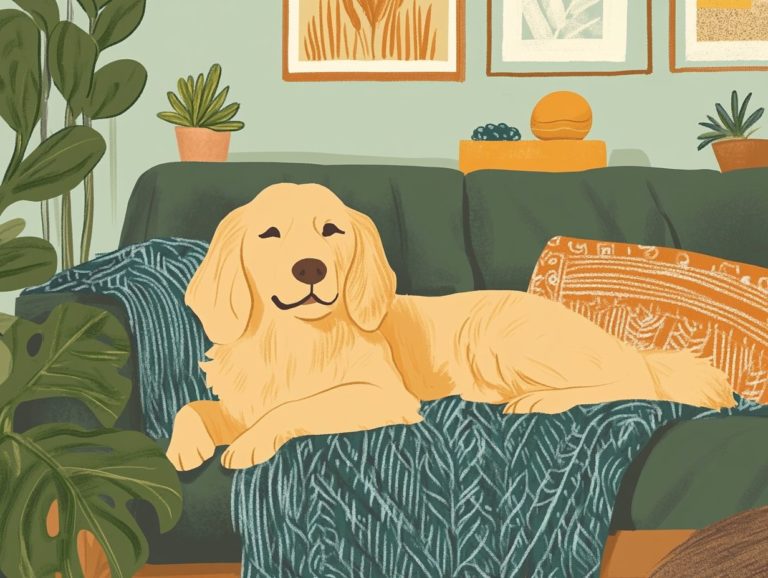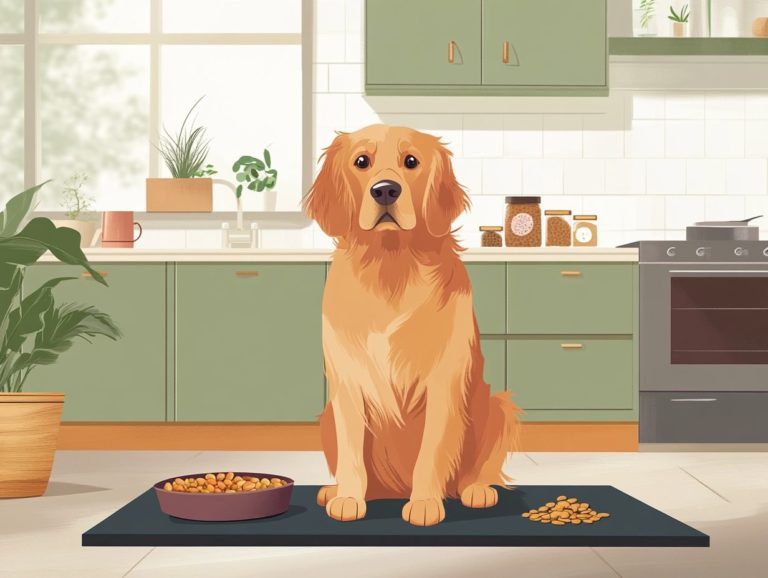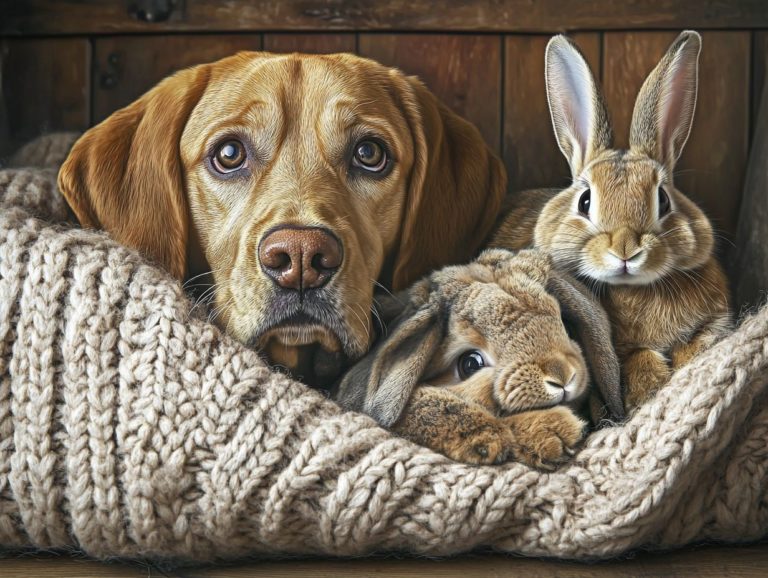Can Pet Anxiety Affect Other Pets in the Home?
Pet anxiety increasingly concerns many pet owners, impacting not only its anxious animal but also its companions.
To cultivate a harmonious home, it s essential for you to understand the causes and symptoms of pet anxiety. This article explains how anxiety shows up in pets and offers practical strategies for both prevention and management.
Whether you’re navigating the challenges of a single anxious pet or managing multiple furry companions, you’ll find valuable insights here to help you foster a calm and supportive environment.
Contents
- Key Takeaways:
- Understanding Pet Anxiety
- How Pet Anxiety Can Affect Other Pets
- Preventing and Managing Pet Anxiety
- Seeking Professional Help for Pet Anxiety
- Caring for Multiple Pets with Anxiety
- Frequently Asked Questions
- Can Pet Anxiety Affect Other Pets in the Home?
- How Can Pet Anxiety Affect Other Pets in the Home?
- Are There Certain Types of Pets More Susceptible to Anxiety?
- Can Pet Anxiety Be Contagious Among Other Pets in the Home?
- What Are Some Signs That Pet Anxiety is Affecting Other Pets?
- How Can I Help My Other Pets Cope with Anxiety?
Key Takeaways:

- Pet anxiety can be caused by various factors and can manifest through different symptoms.
- Pets living with an anxious companion may show behavioral changes and altered interactions.
- Creating a calm environment, training, and seeking professional help can help prevent and manage pet anxiety in a multi-pet household.
Understanding Pet Anxiety
Understanding pet anxiety is vital for devoted pet parents. This emotional distress can arise from factors like separation anxiety or behavioral issues.
These issues can impact your pet’s mental well-being and your bond.
By identifying the signs of anxiety and its underlying causes, you can take proactive measures to offer the emotional support and treatment options that will help alleviate your pets distressful behaviors.
Causes and Symptoms
The causes of pet anxiety can vary widely, from separation anxiety to specific medical conditions in both dogs and cats that may lead to behavior problems.
Understanding these triggers is essential for you as an owner who wants to create a calmer environment for your furry companions. For instance, separation anxiety often arises when pets become overly attached to you, leading to distress during your absences.
Medical issues can also heighten anxiety levels. Situational stressors, such as loud thunderstorms or unfamiliar environments, can provoke responses like excessive barking or destructive behavior.
While dogs may express their anxiety through physical actions like chewing furniture, cats might exhibit it by hiding or displaying aggression. Recognizing these symptoms is your first step toward providing the relief your pets need.
How Pet Anxiety Can Affect Other Pets
Pet anxiety can create a ripple effect that influences other pets in your household, resulting in noteworthy behavioral changes and altered interactions. Understanding whether it is normal for pets to have anxiety can help address the increased emotional distress for everyone involved.
When one pet experiences anxiety, the others may respond negatively, affected by shifts in the home environment or the anxious behaviors of their companion. This leads to the question, can separation anxiety affect all pets? This can initiate a cycle of anxiety that proves difficult to manage.
It’s crucial to give your pets the emotional support they need right now and implement effective stress relief strategies to maintain harmony among all your pets.
Behavioral Changes and Interactions
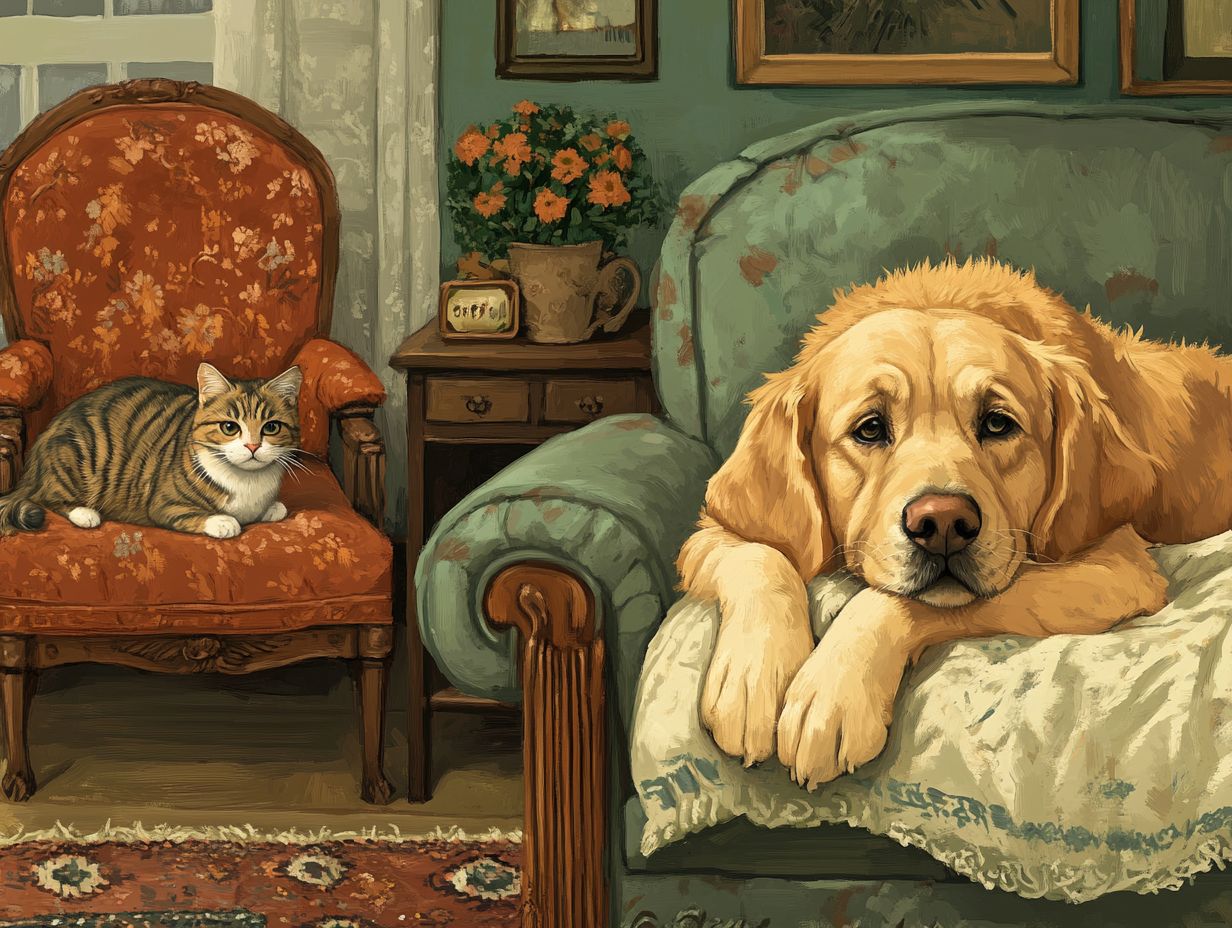
Behavioral changes in anxious pets can show up in various ways, impacting their ability to socialize and interact positively with both humans and other animals. It’s important to explore whether pet anxiety can change over time to better understand and support them.
For example, you might notice that your anxious pet displays signs of aggression when approached by strangers or, conversely, chooses to withdraw entirely from social situations, preferring to hide rather than engage.
These changes can strain the bond between you and your pet and hinder their interactions with other animals, creating an atmosphere fraught with tension and stress.
To help alleviate these challenges, you can implement several effective techniques, such as:
- Create a tranquil space for your pet.
- Use interactive toys to help reduce anxiety.
- Ensure regular, gentle exercise to provide a healthy outlet for any pent-up energy.
Preventing and Managing Pet Anxiety
Preventing and managing pet anxiety requires a complete plan that focuses on making a calm home while incorporating various treatment options tailored to each pet’s unique needs.
By engaging in behavioral training, utilizing calming products, and establishing consistent routines, you can drastically reduce anxiety in your pets today! This fosters a sense of security and enhances their overall well-being.
Proactive care is crucial for ensuring your pets enjoy happy, healthy lives free from distressing behaviors.
Creating a Calm Environment
Creating a calm environment for your pets requires thoughtful consideration of their physical and emotional needs. This includes providing adequate exercise, opportunities for socialization, and companionship.
Start by establishing dedicated quiet areas in your home where your furry friends can retreat and relax, away from the hustle and bustle of daily life. Regular exercise routines are essential. They help manage energy levels and serve as a natural stress reliever, leading to a more balanced demeanor.
Encouraging positive interactions with both humans and other pets can significantly enhance their social skills and build confidence. This reduces anxiety and fosters a strong sense of belonging. By combining these elements, you create a nurturing atmosphere that promotes overall well-being, transforming your home into a sanctuary for companionship.
Training and Socialization
Utilizing positive reinforcement through behavioral training is essential for helping your pets manage anxiety and enhancing their socialization skills.
Implement techniques like clicker training or rewarding calm behavior with treats. This creates a supportive environment that fosters trust and confidence. When your pets associate stressful situations with positive experiences, you ll notice a significant decrease in their anxiety levels.
Engaging in structured socialization activities such as controlled playdates or group obedience classes can dramatically reduce anxiety symptoms by familiarizing your pets with various sights, sounds, and other animals.
Consider complementary treatment options like pheromone therapy which uses scents to help relax pets or calming supplements. Consulting with a veterinarian for tailored strategies can further ensure a gradual and successful adjustment for your anxious pets.
Seeking Professional Help for Pet Anxiety
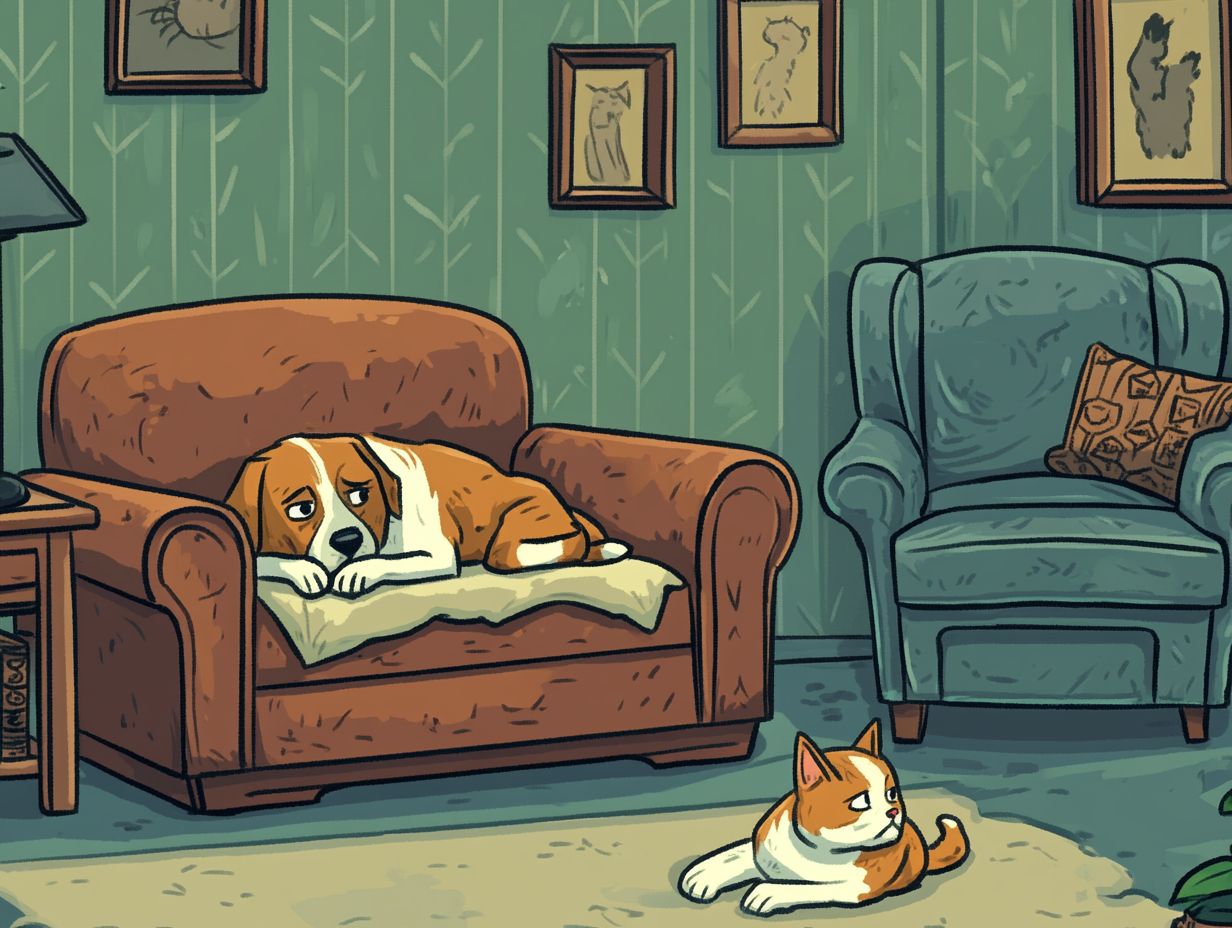
When facing the challenges of pet anxiety, seeking professional help is crucial, especially when behavioral issues become overwhelming or persist despite your best at-home efforts.
Consulting with veterinary behaviorists or animal behaviorists can unlock a wealth of tailored treatment options. These experts are skilled at identifying underlying issues and crafting effective strategies that cater to the unique needs of anxious pets.
By partnering with these professionals, you can significantly elevate your pet s quality of life and emotional well-being, ensuring they thrive in a more tranquil environment.
When to Consult a Veterinarian or Animal Behaviorist
Consider consulting a veterinarian or an animal behaviorist if your pet shows severe anxiety symptoms, such as persistent distress behaviors or signs of separation anxiety disorder.
Look out for red flags like excessive barking, destructive behavior, or refusal to eat. These can signal that your pet is struggling emotionally. Ignoring these signs could worsen conditions that negatively impact your pet’s quality of life. Reach out to qualified professionals for comprehensive treatment plans tailored to your pet s specific needs.
Experts are essential in managing chronic anxiety through behavioral modifications, medication when necessary, and training strategies that promote a more peaceful environment for both you and your furry companion.
Caring for Multiple Pets with Anxiety
Caring for multiple pets with anxiety presents unique challenges. To address these issues, it’s important to explore whether pet anxiety can be cured and implement mindful strategies to support each animal’s emotional needs.
Recognizing signs of anxiety in your pets lets you take action quickly. This helps create a harmonious living environment.
Understanding your pets’ anxiety dynamics is crucial for a peaceful household.
Tips for Managing and Supporting Multiple Anxious Pets
Managing anxious pets requires a mix of reward-based training and tailored attention. Ensuring they have chances to socialize is also vital.
Establishing a consistent daily routine makes a world of difference. Setting fixed meal times, play sessions, and walks creates a sense of security.
Rewarding good behavior with praise or treats helps build confidence. It also promotes a calmer atmosphere.
Encouraging companionship among your pets brings them comfort. They often find solace in each other s company, reducing overall stress.
Frequently Asked Questions
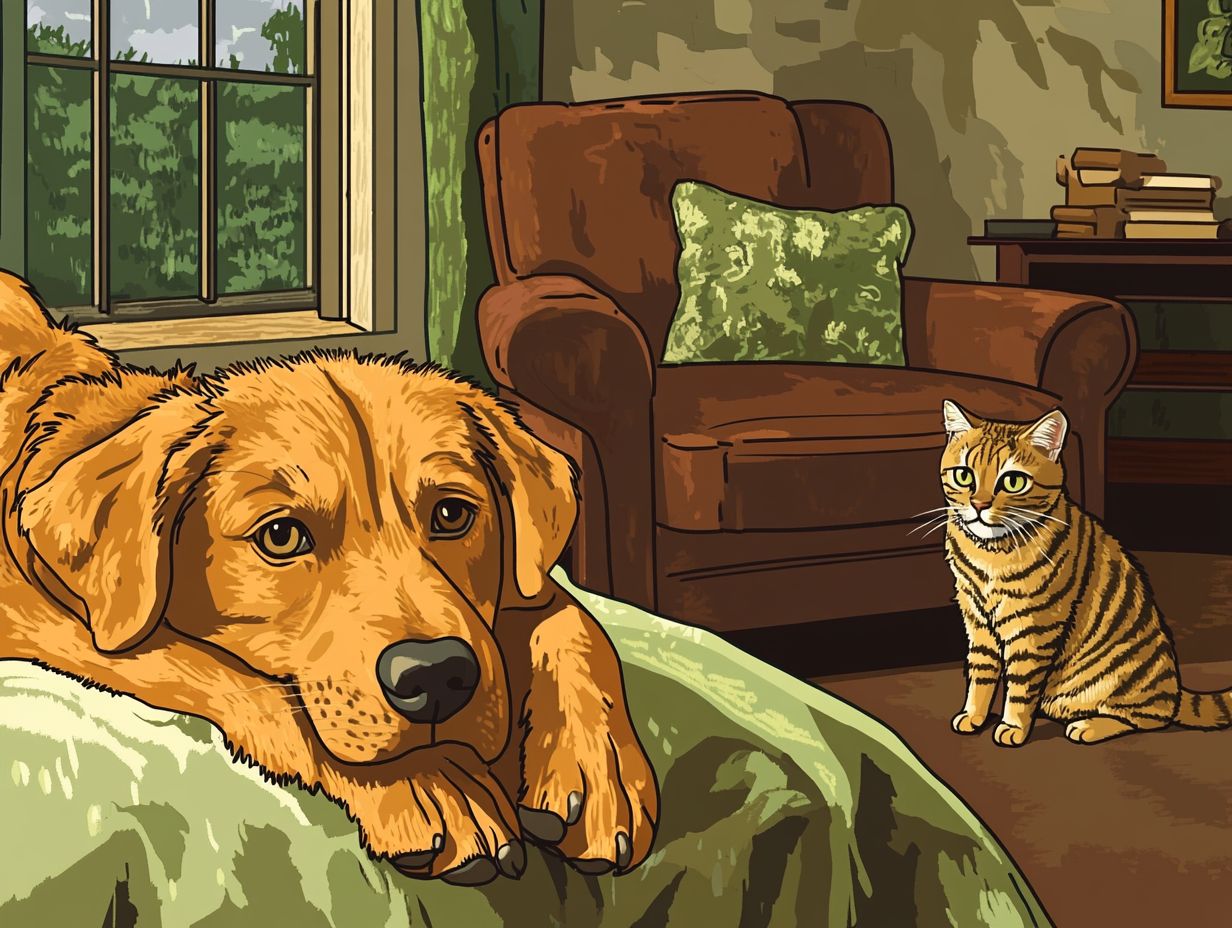
Can Pet Anxiety Affect Other Pets in the Home?
Yes, pet anxiety can definitely affect other pets. In fact, pet anxiety can affect their relationship with me and others, as pets are sensitive to the emotions and behaviors of those around them.
How Can Pet Anxiety Affect Other Pets in the Home?
Pet anxiety can show up in behaviors like excessive barking, destructive actions, and aggression. Understanding whether anxiety in pets is a behavioral issue can help address these problems, as they can stress out other pets, impacting their well-being.
Are There Certain Types of Pets More Susceptible to Anxiety?
Yes, pets like dogs and cats may be more prone to anxiety. These social animals often feel anxious when their companions are stressed, and understanding how anxiety affects a pet’s daily life can help in managing their well-being.
Can Pet Anxiety Be Contagious Among Other Pets in the Home?
Pet anxiety isn’t contagious like a cold, but it can affect other pets. If one pet shows anxious behaviors, it may influence the feelings and actions of the others, especially if that pet is dominant. Understanding how pet anxiety can be managed at home can help create a calmer environment for all your pets.
What Are Some Signs That Pet Anxiety is Affecting Other Pets?
Look out for signs like changes in eating and sleeping habits, increased aggression or avoidance, and overall restlessness. These changes can impact your pets mental health, so it’s vital to pay attention.
How Can I Help My Other Pets Cope with Anxiety?
You can take several steps to help your pets cope with anxiety. Create a calming environment, seek help from a veterinary behaviorist, and reward good behavior. Team up with your veterinarian to find the best solutions for your pets!

